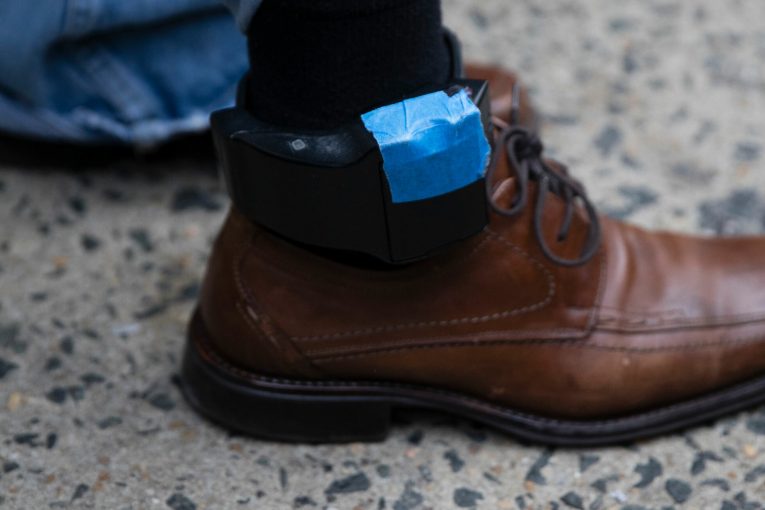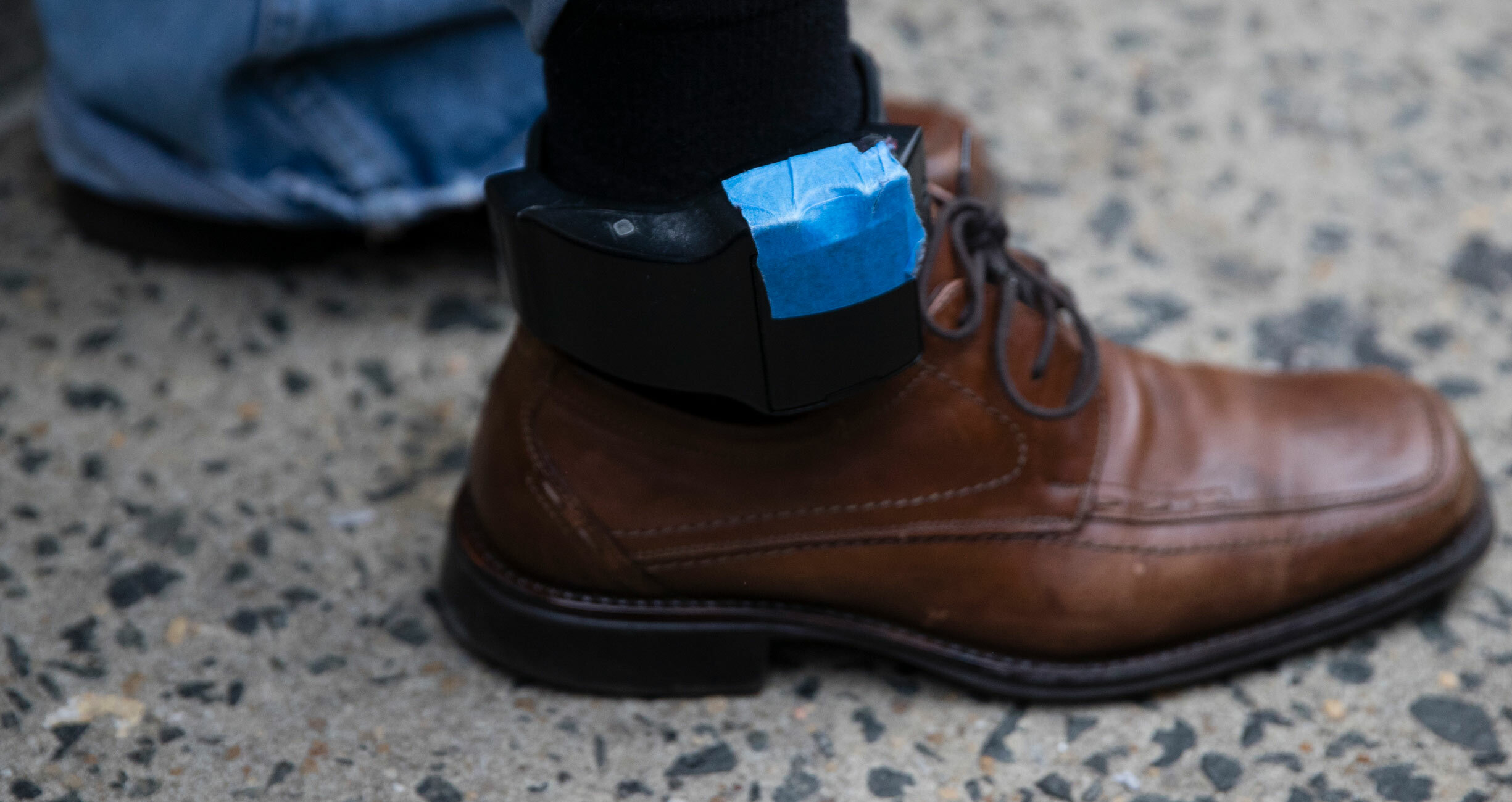

“I spent 30 months on an ankle monitor. It felt crueler than jail.”
By Wesley Vaughan
When you are living with an electronic monitor on, you are free—but you aren’t free enough. I lived with an electronic monitor uncomfortably attached to my ankle for almost 30 months across two different states. I wasn’t in jail, but I wasn’t free either. In a lot of ways, it felt like a crueler form of punishment than incarceration because I could see freedom all around me.
Every day, I could see other people doing these forbidden things—being with loved ones, having a home, working a good job—but I couldn’t safely join. I was an Other, and the most undesirable kind of Other, to boot.
Parole and probation are far from benign—they are the silent giants fueling mass incarceration in this country. One of the weapons parole and probation departments use to perpetuate the cycle of incarceration is the electronic monitor, and it is emblematic of how “community supervision” has strayed so far from its intended purpose of rehabilitation and reintegration. Currently, almost exclusively, its primary function is one of surveillance. A surveillance department ready to strike at the least possible incarcerating infraction on the long list of mainly arbitrary and ambivalent rules.
When I received my ankle monitor for the first time, I was told by my New Mexico parole officer it was going to be my “best friend,” and that he would do everything in his power to send me back to prison. I was given, both verbally and written, a long list of things that I could and could not do. Sometimes, they were contradictory. For example, I could not possess a smartphone or any device with internet access (even though my crime had nothing to do with the internet). If I needed to apply for a job—which I was required to have as a condition of my supervision—my officer said I could go to the library to use a computer there, despite the fact that I had just signed an electronic monitor compliance sheet that expressly forbade me from going to any public libraries.
I was to be on a strict curfew—6 p.m. to 6 a.m.—and even if I wanted to leave my residence during approved hours, I still needed to ask for permission first. My family lived 45 miles away in another county. And even though I was allowed to drive a car, I wasn’t allowed to leave the county to see them. Furthermore, no one was allowed to be at my residence past curfew.
I also wasn’t allowed to go to malls, sports stadiums, parks, or anywhere that was intended primarily for children. I wasn’t allowed to go anywhere “unspecific,” either. “Cruising” or “joy riding would have been a violation. Even going for a walk around my neighborhood was a point of contention with my parole officer. I was a pariah. My monitor reminded me of that every day.
My monitor went off a lot during the first couple of months. Whenever it sounded its alarm, it vibrated incessantly and obnoxiously blurted out “CALL YOUR OFFICER, NOW.” I was getting gelato with my parents and brother during my first week of supervision when it went off for the first time because the gelato shop was part of an outdoor mall. It never occurred to me that doing something as innocent as eating dessert with my family would be a violation.
Another distinct time I remember it going off was when I got a job and the initial training went past my 6 p.m. curfew. I had already cleared this training with my parole officer, but he neglected to update my monitor to reflect this. As soon as I felt the vibration, I hustled out of the training session and sheepishly called the off-duty probation and parole number to tell them I was at work. They fixed it for that night, but it went off again the next, and I had to go through the same process of calling the off-duty number and getting them to adjust it for the night. My parole officer finally adjusted it permanently a few days later, but everyone in my training session already knew what I had wanted to hide.
Finally, after 14 months of clean, sober, productively-contributing-to-society living—during which I had an established residence, multiple jobs, and a life partner—my parole officer fulfilled his promise and put me back in jail for 112 days. He revoked my Interstate Compact and relegated me to live in Oregon, where I had no job, no residence, and knew virtually nobody.
I had an intense amount of shame about the fact that I could not last 14 months out of prison. I berated myself every day while in jail, not knowing when I would get out. I had stopped thinking how stupid it was that a person could be sent to jail at all for possessing a laptop (especially considering my original crime was not internet-based) because parole and probation had broken any semblance of potential self-belonging I had.
After reporting to Oregon and spending a summer in jail, I didn’t initially get an ankle monitor. Instead, I received a rejection for every single residence and job offer I submitted to my parole officer for approval, save one temporary job (which only lasted about a month). So, I effectively violated my supervision conditions every single day by working jobs I wasn’t approved to work and living where I wasn’t approved to live. After about five months of active supervision, while also avoiding getting caught for not being homeless and unemployed, my officer issued a warrant for my arrest after she ran a check and found a utility bill in my name. Again, I felt shame, but it was shame for getting caught again after essentially just getting out of jail six months ago. The shame was about not being smart enough to put everything in someone else’s name. I didn’t think I deserved to go to jail for simply not being homeless, and I also didn’t want to leave my partner alone and without my income for up to three months, possibly more.
It caught up with me after 16 months. I lived with a warrant out for my arrest for 16 months, drinking almost every day and living constantly on edge, still feeling like I didn’t belong because there was so much I couldn’t do. I turned to alcohol, something I had struggled with my entire adult life.
In June 2022, I woke up in a jail cell and, 152 days later, was released back to the conditions of “community supervision” that had contributed to my absconding in the first place. This time, it was worse. My parole officer attached an ankle monitor to me to ensure my homelessness.
For the remaining 16 months, I scraped together enough money to live week-by-week in various motels, where my officer had no authority since it was a temporary residence. I again tried to find legitimate income and permanent housing but was denied every single time by my officer.
There was nothing constructive about having my ankle monitor on. It didn’t monitor my blood alcohol levels, and it didn’t prevent me from going to where alcohol was served; it simply was a destructive force. It was designed to punish me. The conditions I lived under were not ubiquitous across the state. In neighboring counties, other people on the registry went on vacations to Florida, had stable homes and jobs, and were allowed to be with their families. I wasn’t. I was exceptionally distinct, even among pariahs.
After reading other people’s stories and experiences about living with an ankle monitor, I know that mine is not uncommon and, sadly, is a mild one. The commonality, however, seems to be a psychological one: when you are on an electronic monitor, it feels like you are more restricted than when you are incarcerated. Freedom is all around you—but it isn’t for you.
Originally published by Vera Institute of Justice
Wesley Vaughan is a formerly incarcerated writer whose nonfiction has appeared in The Appeal, Inquest, and Truthout. Until recently, he was on parole and homeless. He remains a registered sex offender and lives with his partner in Oregon.
